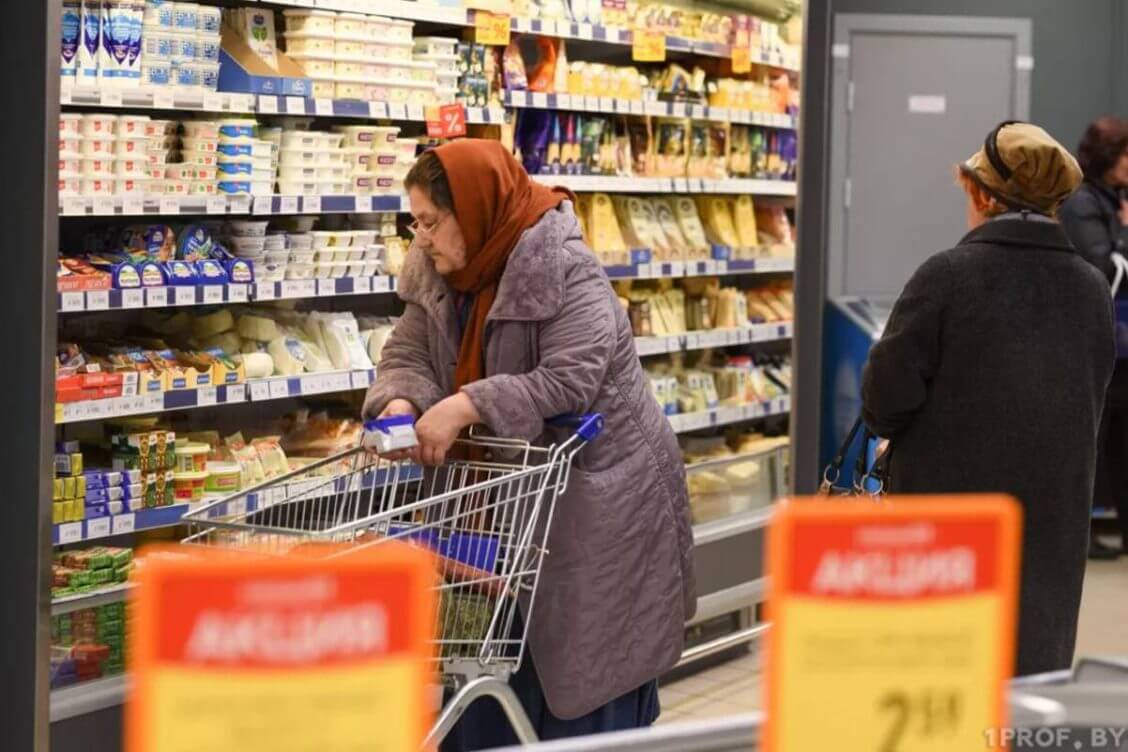Minsk has been trying to curb prices for more than a year, but seems to be losing a battle against market forces.

On December 21, Alaksandar Łukašenka called a conference with three dozen officials to discuss prices. After Russia invaded Ukraine, Minsk introduced price controls to curb inflation, but the caps wiped out businesses’ profitability.
“You can’t fool the economy”
From the outset of the meeting, the Belarusian leader noted that some journalists and officials misunderstood his orders last year.
“When I instructed the government to deal with this issue, it was not about freezing or even curbing prices,” he said. “It was about price regulation. Somewhere prices were curbed, somewhere they went up. You can’t fool the economy.”
“We understand very well that if we freeze a price that cannot be frozen, tomorrow the goods will disappear. No one would work at a loss,” said Łukašenka.
First Deputy Prime Minister Mikałaj Snapkoŭ, in charge of price controls, said that prices would be set at a “reasonable level” rather than frozen.
Seemingly surrendering to economic laws, officials pledged to establish “a clear and transparent system of price regulation” from January 1, 2024.
“No manufacturers, businessmen, traders, and others who provide services should have to run to the Ministry of Antimonopoly Regulation and Trade, [other] ministries, or the government. They should not run there to obtain approvals for prices,” Łukašenka said.
He admitted that prices should not be adjusted by orders, but failed to offer any solutions.
He told the government to define everyone’s tasks. “From inspectors to deputies to the prime minister. If you need to involve me, do so. But the problem must be solved.”
Controls slow price increases
One year ago, Łukašenka said exactly the opposite: prices should be frozen rather than adjusted.
“From October 6, all price increases are forbidden. They are forbidden from today. Not from tomorrow, but from today, so that they [retailers] don’t raise prices in 24 hours. That’s why price increases are forbidden from today. And God forbid someone in an accounting department do some retroactive calculations and recalculations,” he said.
He stressed that there could be exceptions but allowed the antimonopoly ministry and the heads of regional authorities to make exceptions. “Without their permission, no price can increase from today’s level,” Łukašenka said.
The very next day, he signed Directive № 10 banning price increases.
The move helped the government reduce inflation, which was in double digits in October 2022. Belarus reported a 4.9 percent increase in consumer prices in the first 11 months of 2023.
This year, Snapkoŭ promised that annual inflation will not exceed 5.6 percent. Officials assume that it is impossible to keep inflation in check without price caps.
And they take it seriously. Lawmakers and officials are checking price tags at stores, while courts even tried executives accused of unauthorized price increases. The cabinet wrote special poultry pricing rules.
Three weeks after his Directive No.10, Łukašenka admitted that prices were being kept down by plundering the rich. “It turns out that they have accumulated so much fat, especially retail chains and producers, that there is quite enough fat to flitch off.”
The downside of price controls is that they may lead to the build-up of an “inflationary overhang,” which can trigger catch-up price hikes. In fact, inflation has accelerated at the end of the year.
Another side effect is lower profit margins. Snapkoŭ said that nearly 20 percent of Belarusian retailers were unprofitable, citing data from approximately 850 companies. “It could not have been otherwise because we controlled markups,” the Belarusian leader’s press office quoted the deputy prime minister as saying.
Other countries, even war-torn Ukraine, have been doing better without emergency measures. In the European Union, inflation slowed down to 3.1 percent at the end of November.
In run-up to elections, Łukašenka needs victory over inflation
The ban on price increases has never been properly enforced. Ministries introduced numerous amendments allowing manufacturers and retailers to raise prices for certain goods and services with approval from officials.
Polls showed public approval of price controls. Before the signing of Directive No. 10, about 98 percent of Belarusians were concerned about rising prices, so the Belarusian ruler might have benefited from his policy of populism. No polls have been conducted to determine the effect of his pricing policy on his ratings.
The measures had a temporary effect and a new surge in inflation is looming. Contradicting his own words from a year ago, Łukašenka seems to admit the defeat, saying that he did not intend to trick people into liking him as a dedicated fighter for reasonable prices.
“It is not pre-election populism. We have been dealing with this issue all along. But since it was not resolved, a strong decision was made,” he said.
Meanwhile, the government gears up for parliamentary and local elections in 2024 and a presidential election in 2025. The continuing reprisals have paralyzed civil activity.
Elections in Belarus are a state-managed ritual without pluralism or competition. However, officials act nervously, fearing to anger voters and give opponents chance to strike back.
In an effort to win over voters, the government has advertised anti-corruption measures and pay increases, and continues to use propaganda, mass media, arts, patriotism and rallies to create a heroic image of the leader. Minsk desperately needs a convincing victory at this point, but its battle against inflation is not going well.